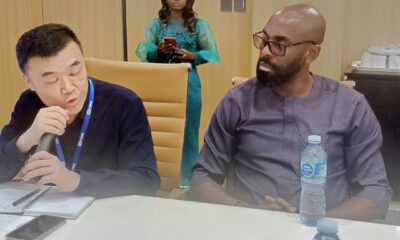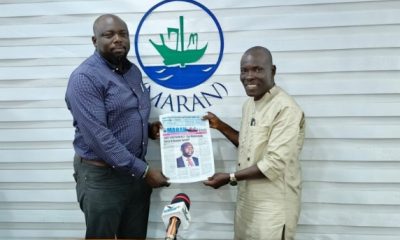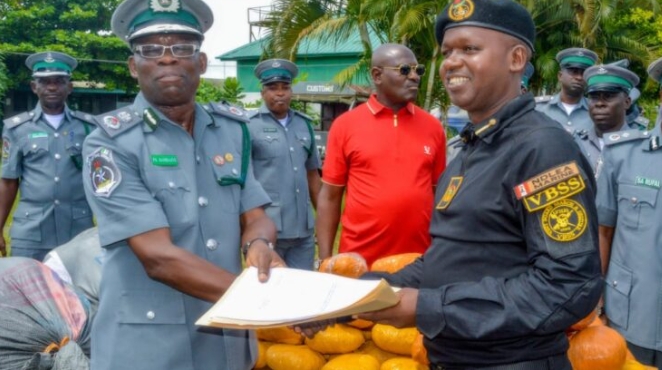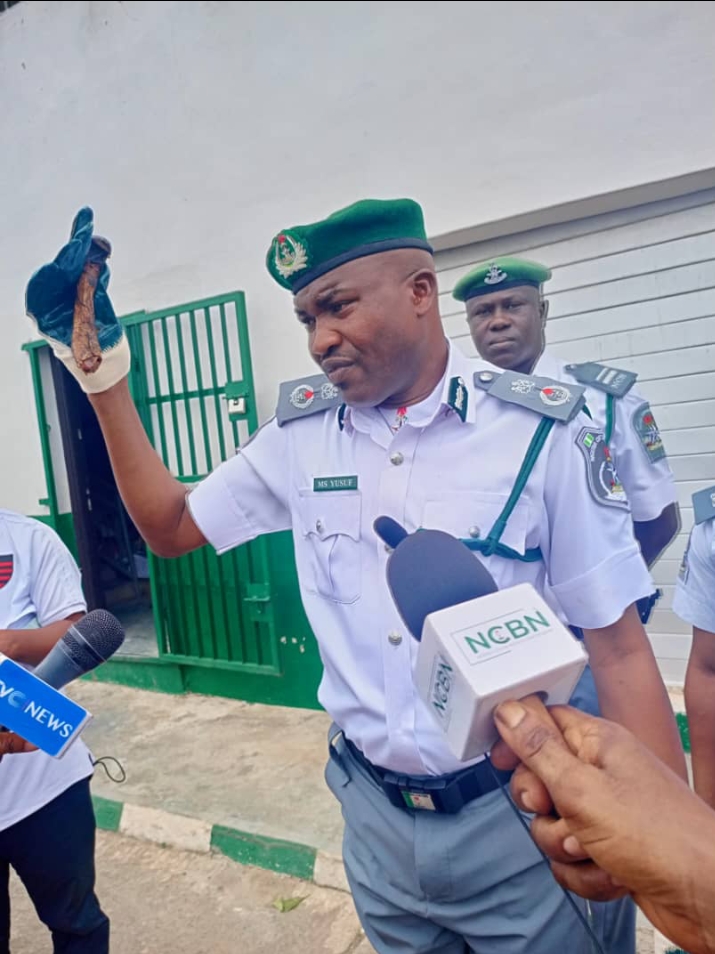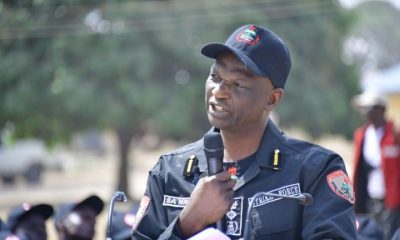Maritime Agencies
NDLEA Raises the Alarm As Drug Cartels Now Degrade the Environment, Cause Deforestation
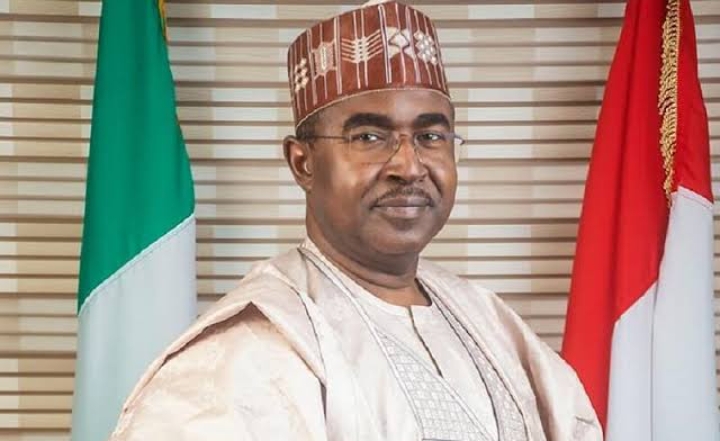
By Izuchukwu Ozoemena
Nigerian drug cartels now degrade the environment through illicit crop cultivation and deforestation.
The Chairman/CEO, National Drug Law Enforcement Agency (NDLEA), Brig. Gen. Mohamed Buba Marwa (Rtd), disclosed this while outlining efforts by Nigeria to curb the menace of substance abuse and illicit drug production and trafficking at the third committee session of the recent 78th session of the United Nations General Assembly in New York, USA.
According to him, the agency plans to install alternative development strategies that will not only take the cartel out of business but will protect the environment from the damaging effects of illicit drug cultivation and production which they practise.
“Cartels involved in illicit drug cultivation are causing deforestation, resulting in environmental degradation. In search of a lasting solution, we are working to implement an alternative development plan.
This will provide cannabis farmers with better options, such as agricultural loans and improved seedlings. The increasing online activities of drug traffickers, particularly on the dark web, after the COVID-19 pandemic have become a great source of concern.
This will require collaboration and capacity-building to neutralize the growing threat. Nigeria is also strengthening its legal framework through on-going amendments to relevant drug laws.
“Our bilateral and multilateral cooperation efforts have been expanded through the signing and renewal of memoranda of understanding with countries and agencies. This has helped to deepen intelligence sharing, exchange programmes, joint operations, and capacity building, among others.”
Marwa said the Nigeria’s premier anti-narcotics agency will continue to identify gaps and build bridges, both in dismantling drug trafficking cartels and providing access to treatment and counselling services.
“More policies to protect vulnerable groups such as women, children, and displaced persons will be implemented.
To maintain a clear lead over drug trafficking groups, we will continue to engage in thoughtful regulations and targeted strategic law enforcement that are intelligence-led and human rights-centred. We will also leverage stakeholder collaboration as we make progress in the implementation of the SDGs.
No stone must be left unturned, and no community, group, or individual must be left behind. We must extend the fight against drugs on all fronts and ensure that our communities are safe, healthy, and peaceful”, he told the global gathering.
He added that Nigeria is adopting a whole-of-society approach to counter the challenges of drug trafficking in line with the 2030 SDG agendanwhich seeks to promote the rule of law, health, peace, and justice.
“Therefore, while ramping up law enforcement efforts to halt the illicit supply of drugs, we are equally promoting evidence-based drug prevention, treatment, and care programmes.”
While stating that Nigeria is concentrating efforts on mitigating the challenges of narcotic drugs, he declared that “the drug demand reduction strategies are also helping to address the problem of stigmatization and discrimination against people with drug use disorders.
This include the introduction of a 24/7 toll-free call centre where people can call from the comfort of their homes to access quality counselling, treatment, and care.”
“Remarkable progress has also been made in early prevention programmes in schools and communities. This is in accordance with SDG 3, which seeks to promote good health and well-being.
One of the approaches is to build the capacity of young people and provide them with the basic coping skills they need to succeed in life. The Nigeria Drug Law Enforcement Agency (NDLEA), in collaboration with the United Nations Office on Drugs and Crime (UNODC) and the MTN Foundation, is promoting the Unplugged Drug Programme in schools.
“I am glad to inform that the implementation of the National Drug Control Master Plan (NDCMP) 2021–2025 is in its third year. This is Nigeria’s strategic document for addressing the world drug problem.
One of its advantages is the involvement of stakeholders at all levels of government. The master plan provides a multi-agency intelligence-led model that is aimed at disrupting drug trafficking cartels and targeting illicit drug assets and wealth.
Maritime Agencies
OIL FACILITIES PROTECTION: Tompolo’s Tantita Acquires High-Tech Drones From US Firm.

By Izuchukwu Ozoemena
Tantita Security Services Ltd (TSSL), the company in charge of security surveillance over oil and gas installations in Nigeria’s Niger Delta region, is in collaboration with Textron Systems Corporation, a United States–based defence and aerospace company, to supply her three advanced Aerosonde Mk. 4.7 Vertical Takeoff and Landing (VTOL) uncrewed aircraft systems (UAS).
TSSNL owned by Chief Government Ekpemupolo (popularly known as Tompolo) disclosed the business deal in her website publication of December 29, 2025. The drones will be delivered in a fully ITAR-Free configuration.

The Aerosonde Mk. 4.7 is designed to operate without runways, utilising hybrid quadrotor technology that enables vertical takeoff and landing, as well as fixed-wing flight.

The Aerosonde Mk. 4.7 VTOL UAS, Textron Systems says, is a mature, industry-proven autonomous platform known for its high reliability and operational flexibility. Its dual-mode capability allows it to operate seamlessly in complex and high-risk environments, making it well-suited for security operations within Nigeria’s oil and gas sector.
Giving further insight into the contract, Senior Vice President, Air, Land and Sea Systems at Textron Systems, David Phillips, said the deployment would significantly enhance Tantita’s operational capability.
”The Aerosonde Mk. 4.7 VTOL UAS is a proven solution that will enable Tantita Security Services to expand its capabilities to protect the oil and gas infrastructure essential to Nigerian security and prosperity,” he stated.
The Aerosonde platform has accumulated over 700,000 flight hours across some of the world’s most challenging operating environments, underscoring its reliability and performance.
Tantita Security Services is expected to deploy the systems to strengthen surveillance and protection of critical oil and gas assets across Nigeria.
The contract also includes options for operator training and the supply of additional aircraft to support future capability expansion. Textron Systems noted that the agreement builds on a previous Foreign Military Sale (FMS) contract to Nigeria, further highlighting its ongoing commitment to supporting Nigerian security operations.
Textron Systems is a global leader in uncrewed air, land and sea systems, with the Aerosonde family of UAS currently supporting international customers and operations aboard more than 10 U.S. Navy ships. The company is a subsidiary of Textron Inc. (NYSE: TXT), a diversified multinational with interests spanning aviation, defence, industrial manufacturing and finance.
With multiple payload configurations and comprehensive training and support services, the Aerosonde Mk. 4.7 VTOL UAS offers a versatile and efficient solution for security operations in demanding environments, reinforcing Tantita Security Services’ role in safeguarding Nigeria’s critical energy infrastructure.
Maritime Agencies
NEW YEAR CELEBRATION: MARAN Appreciates Stakeholders, Requests Greater Support and Collaboration in 2026.
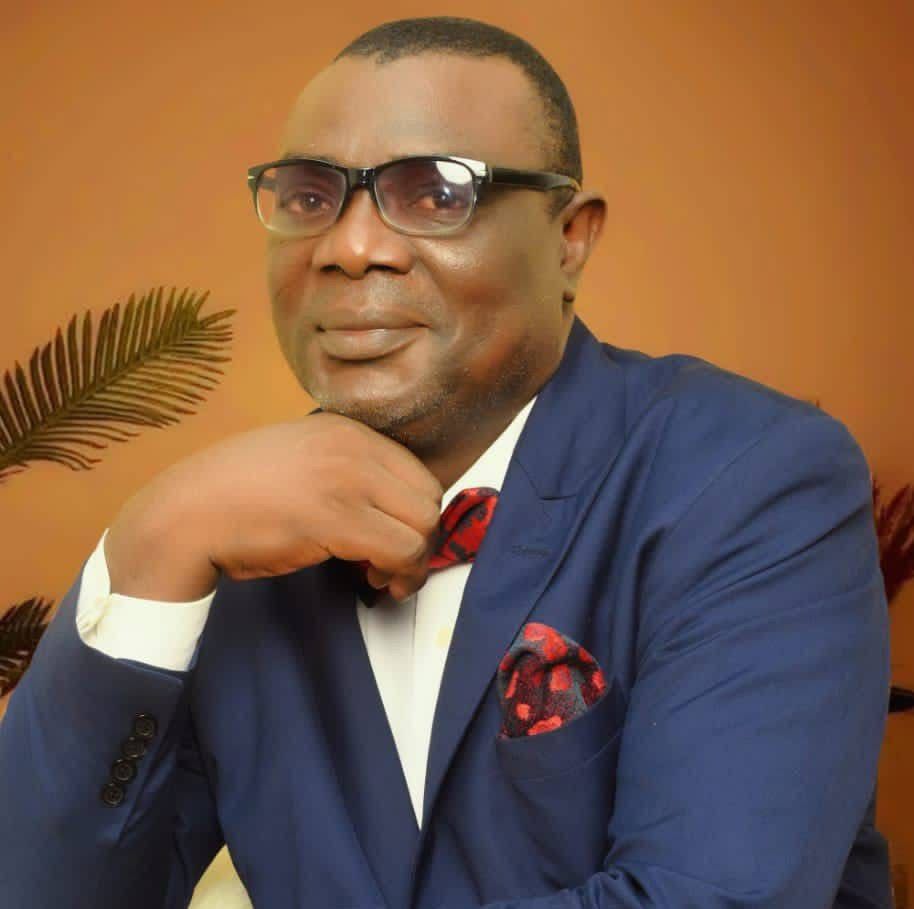
By Izuchukwu Ozoemena
As Nigeria joins the rest of the world to celebrate a brand new year, the pioneer maritime journalists’ group, the Maritime Reporters Association of Nigeria (MARAN), has implored the entire business community, especially maritime industry stakeholders, to join the association afresh in advancing the cause of the industry to ensure more impact and relevance in the national economy in the new year and beyond.
In a New Year message, MARAN Chairman, Mr. Tunde Ayodele described 2026 as a “year of greater impact,” stressing the need for improved service delivery and more robust maritime reportage to support national development.
According to him, the collective efforts of stakeholders in the outgoing year contributed positively to the growth of the maritime sector, urging all parties to sustain the spirit of unity and collaboration in the new year.
“United, we can make Nigeria proud by contributing our quota to national development, each from our own little corner,” the MARAN chairman said.
Ayodele reaffirmed MARAN’s readiness to collaborate with organisations and institutions across the maritime value chain, noting that such partnerships are crucial to making Nigeria’s maritime space one that is admired and celebrated.
He expressed appreciation for the cooperation and support extended to the association throughout 2025 and called for renewed commitment in the year ahead.
“Thank you for your cooperation and support in 2025. Let us do it again in 2026,” he added.
Maritime Agencies
NIGER DELTA SECURITY : Tantita Arrests 4 Oil Thieves, Nabs Vessel .
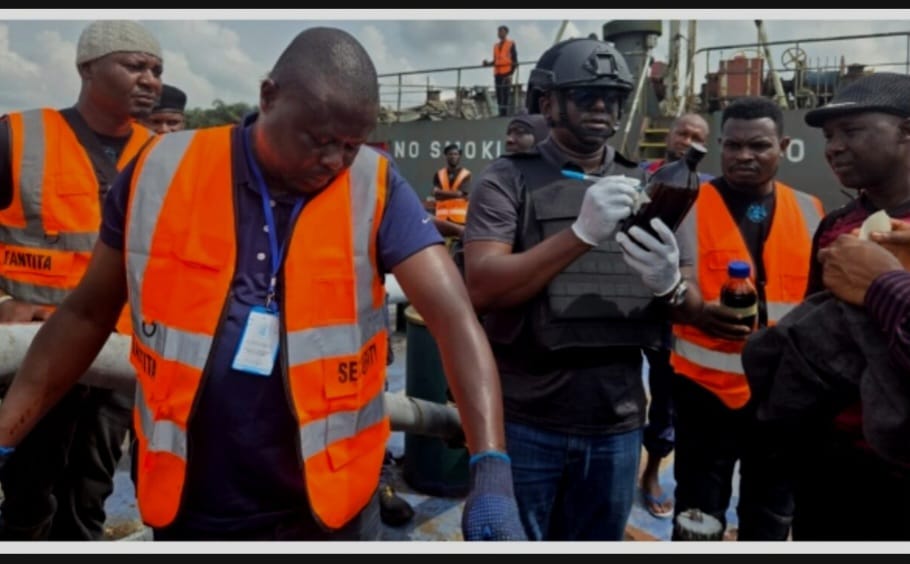
By Izuchukwu Ozoemena
In the ongoing efforts to thwart economic sabotage in the Niger Delta, Tantita Security Services Ltd, the firm engaged in pipeline surveillance operations in the oil -rich region, has nabbed four suspected oil thieves, intercepting their vessel named MT Thor. Suspects are to undergo trial for economic sabotage .
Speaking at the handover of the suspects at Koko Port, Tantita’s Executive Director of Operations, Capt Warredi Enisouh, said the suspects were apprehended with an unspecified quantity of suspected illegally-sourced petroleum products aboard the vessel.
The interception occurred on 15 December 2025, around the Koko–Excravos axis of Delta State, says a situation report made available by the Special Prosecution Team (SPT) of the Inter-Agency Task Force on Petroleum Product Theft.
The report stated that Tantita alerted the Head of Investigation of the SPT after intercepting MT Thor, allegedly laden with crude oil obtained through illicit means.
It was further alleged that the vessel was being escorted by personnel of the Police Marine Unit, Delta State, who reportedly claimed they were acting on directives from the Force Intelligence Department (FID), Abuja.
Preliminary investigations by law enforcement agencies revealed that the vessel, now classified as an exhibit in an ongoing criminal investigation, is linked to a jetty operated by Ebenco Global Services Limited. Investigation officers disclosed that documents and correspondence connected to the jetty were obtained and are currently under review.
“The owner of the jetty, Mr. Ebenezer, was contacted by investigators and reportedly provided additional documents, including court orders, which are also being analysed as part of the investigation.
“On December 16, a joint investigation team led by the Head of Investigation of the SPT conducted a Joint Inspection Visit in Koko. The team first met at Tantita’s corporate headquarters in Warri for a briefing, which was also attended by the jetty owner.
“During the inspection, investigators attempted to obtain samples from MT Thor but were unable to do so immediately as the vessel had not yet arrived at the jetty, having been towed from an earlier location by security operatives.
“While awaiting the vessel’s arrival, the team inspected other containers suspected to be carrying crude oil within the premises of Ebenco Global Links Limited, where samples were taken from a storage barge.
“MT Thor eventually berthed at about 8:30 p.m. on 16 December, prompting the joint team to adjourn sampling and other procedures until the following day. As of 17 December 2025, investigators were reported to be en route to Koko to continue sample collection and complete investigation formalities,” the report read.
Receiving the suspects, the Head of the Special Prosecution Team of the Inter-Agency Task Force, Omar Sini, reaffirmed the Federal Government’s resolve to dismantle crude oil theft networks in the Niger Delta, assuring that all findings would be thoroughly examined and prosecuted in line with the law.
-

 Customs3 weeks ago
Customs3 weeks agoTincan Customs Achieves N51.8Bn Surplus Above 2025 Revenue Target
-
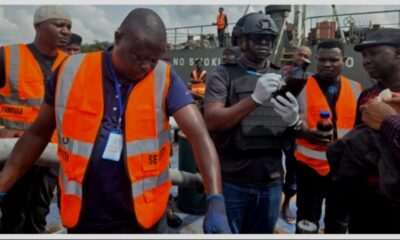
 Maritime Agencies3 weeks ago
Maritime Agencies3 weeks agoNIGER DELTA SECURITY : Tantita Arrests 4 Oil Thieves, Nabs Vessel .
-

 Maritime Agencies1 week ago
Maritime Agencies1 week agoOIL FACILITIES PROTECTION: Tompolo’s Tantita Acquires High-Tech Drones From US Firm.
-

 Maritime Agencies2 weeks ago
Maritime Agencies2 weeks agoNEW YEAR CELEBRATION: MARAN Appreciates Stakeholders, Requests Greater Support and Collaboration in 2026.




